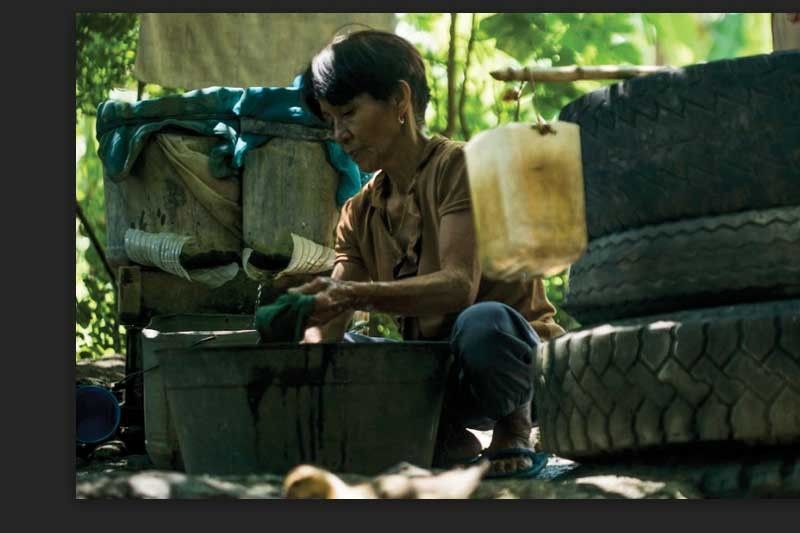‘Unpaid care work is real work’: Addressing gender roles in household

MANILA, Philippines — In a society, there are roles in which people are expected to act and conduct themselves according to their assigned sex.
These role expectations, however, create unequal and discriminatory treatment due to a person’s gender that eventually becomes a norm in society.
As the pandemic has forced people to stay at home, Filipino women continue to spend more time doing household duties compared to men, the 2021 National Household Care Survey found.
The survey, conducted by Oxfam Philippines--a poverty alleviation organization--showed that women spent up to 13 hours a day juggling unpaid care work, while men only spent eight hours, Lot Felizco, director of Oxfam Philippines said in “Usapang Gawaing Bahay sa Panahon ng Pandemya” webinar on June 22.
The term “care work” is identified as tasks families do at home such as doing the laundry, washing the dishes, caring for children, etc.
Addressing inequality
The survey also revealed that too much care work affects the well-being of women.
“The research showed that 1 out 3 Filipina had experienced injury, illness, disability or other forms of harm through their care work in the past six months and the top three illnesses are backache, muscle and joint ache, headache and dizziness, and stress and irritability,” said lawyer Kristine Chavez, executive director of the Philippine Commission on Women.
Chavez laid out initiatives on how to address Unpaid Care and Domestic Work (UCDW) in the country:
Recognize
“Firstly we have work to recognize and make visible the value of unpaid care work.”
The country’s commitment to SDG Target 5.4 which is to recognize and value UCDW is reflected in the Philippine Development Plan for 2017-2022 as a way to accelerate Human Capital Development.
The Philippine Statistics Authority (PSA) works with the International Labour Organization (ILO) to develop a new set of guidelines for measuring paid and unpaid work, while the Philippine Commission on Women performed a survey to analyze the severe impacts of COVID-19 on women micro-entrepreneurs.
Reduce
“After recognizing the unequal burden of care work on women and girls, we also seek to reduce this burden so they may enjoy equal opportunities in education, economic activities and other endeavors of their choosing.”
The Department of Agriculture and the Department of Science and Technology work closely together to advance innovative equipment and technologies that are helpful to women’s needs. The Department of Social Welfare and Development also trains women in constructing and managing water systems to help ease their household work.
Redistribute
There are various laws that aim to redistribute UCDW such as the following:
- Article 70 of the 1987 Family Code;
- Article 209 of the 1986 Family Code;
- Republic Act 7192 or the Women in Development and National Building Act of 1992;
- The Expanded Maternity Law;
- Republic Act 9710 or The Magna Carta of Women’
- The Anti-Violence Against Women and their Children Act;
- The Expanded Breastfeeding Law; and
- Domestic Workers Law
The call for redistribution also includes gender-fair education. While gender stereotypes are still evident in school textbooks, the curriculum is now in the works to being updated.
The Social Welfare department also uses the Conditional Cash Transfer for Filipino families to attend “monthly family development sessions where beneficiaries are taught on gender equality, responsible parenthood, violence against women and children, healthy living relationships between husband and wife, HIV, AIDS, etc.”
“Recognizing, Reducing and Redristubitng the UCDW requires a holistic approach with strong collaboration among government and private stakeholders. Further, we cannot emphasize enough the need for more data to show how the care economy contributes to our economy’s and the society’s well-being,” Chavez stressed.
In this regard, she addressed the following recommendations:
- Make unpaid care and domestic work visible through research, time use surveys and other appropriate methods
- Strengthen collaborations with relevant government agencies, including national statistics agencies and labor departments to prioritize valuation of care work
- Provide opportunities for women and men to participate in the labor force while performing care work
- Involve private stakeholders and civil society
- Address the root causes of inequality through education especially to combat harmful gender stereotypes and gender bias
- Provide a platform for men and boys to expand their roles in the family, and community-building
Household teamwork
To help eradicate inequality among genders, it must all start within us--in our homes.
Lawyer Third Bagro and physician Tina Langit-Bagro, also known as Mr. and Mrs. Domesticated on Instagram, mentioned insights on how they balance their roles in the household.
Here are the three tips they shared to achieve harmony and teamwork within the family:
Be open-minded
“If bukas ‘yung isip ng mag-asawa, mas madali ‘yung sistema ninyo sa gawaing bahay. Kapag bukas ‘yung isip kasi, bukas din ‘yung puso na gawin ito ng buong pagmamahal. Kasi ‘yung mga bagay na ’to hindi naman ginagawa para lamang sa asawa, ginagawa ito for the family kasi basic siya para mag-function ‘yung pamilya.”
Give and take
“Kapag mas marami kang binibigay, mas marami ka ring kukuhanin 'di ba? Syempre meron siyang gusto sa bahay, meron [rin] akong gustong gawin. We talk about it and then we adjust. You wouldn’t know what the other would want if you don’t communicate very well. So I think in all of these things, communication is the core strategy.”
Always find out what brings your joy
“Hanapin kung ano ‘yung mas nagpapasaya sa gawaing bahay at doon kayo mag-focus.”
Legislations
Meanwhile, Vice Mayor Leo Candido of Quinapondan, Eastern Samar discussed how his municipality adopted WEE-Care Ordinance, a participatory approach to recognize UCDW in the local legislation.
As part of the implementation of the ordinance, the municipality provided initiatives such as purchasing of cooking stove, rice cooker and kitchen utensils.
“Mas maraming kumuha ng cooking stove kasi kapag sa umaga ‘yung nanay, siya ‘yung nagluluto, minsan walang panggatong, kaya mas ginusto nilang magkaroon ng cooking stove dahil mura at matipid,” he said.
Asked about the noticeable changes in the municipality, Vice Mayor Candido said that a lot of men now recognize and involve themselves in the household work.
“Marami sa mga kababayan ko rito, lalo na ‘yung mga kalalakihan, na gumagawa na rin ng care work sa bahay. Naghahatian na ng trabaho sa bahay. We hope na magkaroon ito ng domino effect, hindi lang sa isang barangay, kung hindi pati sa buong bayan na,” he added.
The ordinance is now adopted by 12 out of 25 barangays.
Call to action
In the same survey conducted in 2017, women spent up to 12 hours of unpaid care work, while men spent five.
“Looking at the bright side of it, there is also some growing evidence that traditional social norms of productive work or breadwinning and unpaid care domestic work could be changing due to the pandemic,” said Leah Payud, resilience portfolio manager of Oxfam Philippines.
While the recent 2021 survey showed that the hours spent by men on unpaid care work increased, it still does not change the fact that women still have more working hours.
“Hindi siya automatic translation na may gender equality na sa Pilipinas,” she said.
Payud stressed the need to strengthen the awareness-raising that “unpaid care work is real work.”



















